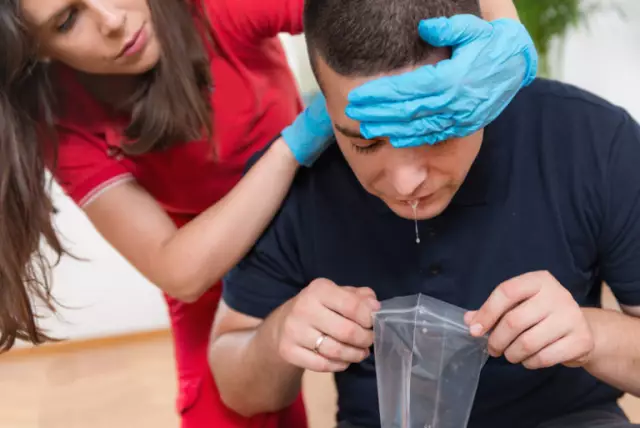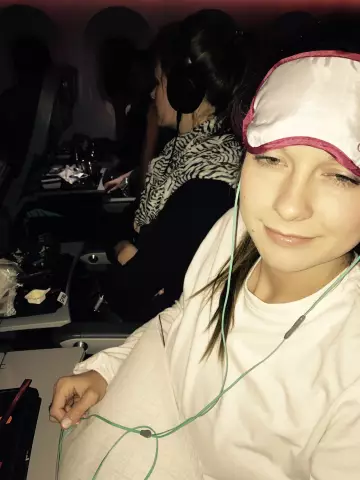- Author Rachel Wainwright wainwright@abchealthonline.com.
- Public 2023-12-15 07:39.
- Last modified 2025-11-02 20:14.
Poisoning with sleeping pills
Insomnia can be caused by a variety of factors, such as stress, overwork, illness, and sometimes joyful overexcitement. Not all types of insomnia require treatment. But long-term, persistent insomnia can cause serious health problems, so sleeping pills are used to combat it.

Source: depositphotos.com
Contrary to popular belief, the pharmacopoeia does not contain a separate group of hypnotics. Many groups of drugs have a hypnotic effect:
- barbiturates (Thiopental, Phenobarbital);
- benzodiazepines (Phenazepam, Nitrazepam, Nozepam, Relanium);
- cyclopirolones (Sanval);
- adaptogens (Melaxen).
The drugs of these groups are used to treat various pathologies, not only sleep disorders, and they all have a number of side effects, so they should be used strictly according to the doctor's prescription.
How is poisoning with sleeping pills?
Poisoning with hypnotics occurs when the therapeutic dosage is exceeded. This situation can be either accidental or deliberate - as a rule, high doses of sleeping pills are used for the purpose of committing suicide.
Once in the body, hypnotics have a depressing effect on the central nervous system, and in a dose exceeding the therapeutic dose, they suppress the respiratory and vasomotor centers.
Poisoning symptoms
According to the severity of the clinical symptoms of hypnotic poisoning, they are divided into several degrees.
Light poisoning
The victim is in a state of excessively deep and prolonged sleep, but he can be awakened by painful irritation or a sharp shout. Reflexes, rhythm and depth of breathing are preserved, heart rate and blood pressure correspond to the age norm. The pupils are sharply narrowed (miosis), salivation may be increased. If untreated, the victim wakes up after 10-15 hours.
Poisoning of moderate severity
The sleep is very deep, it is impossible to bring the victim out of it even with strong physical irritation, however, a sound or motor reaction can be a response to intense irritation. The activity of reflexes is reduced, the minute volume of pulmonary ventilation is reduced. The victims have a divergent strabismus, dilated pupils (mydriasis). In the absence of treatment, spontaneous awakening occurs in 1-2 days.

Source: depositphotos.com
Severe poisoning
The patient falls into a coma, reflexes fade away. Respiration disorders progress - it becomes more frequent and becomes superficial. Against the background of suppression of the cough reflex and hypersalivation, airway obstruction may develop. Peripheral circulation suffers, blood pressure decreases. Without treatment, coma persists for 5-7 days, during which respiratory and cardiovascular insufficiency increases. The condition ends in death against the background of hypoxic cerebral edema.
Extremely severe poisoning
It is characterized by the rapid development of severe coma with severe respiratory and cardiovascular disorders. Due to serious damage to the vital centers of the brain, death occurs within a few hours.
First aid for poisoning with sleeping pills
At the prehospital stage, in case of poisoning with sleeping pills, it is advisable for victims to rinse the stomach, but it is forbidden to perform this procedure for people in an unconscious state (including those in deep sleep), as well as children of the first years of life. For gastric lavage, you should drink several glasses of warm water or a slightly pink solution of potassium permanganate, after which, by pressing on the root of the tongue, induce vomiting. The procedure is repeated several times, achieving the fullest possible cleansing of the stomach.
After gastric lavage, you should take an absorbent (Activated carbon, Smecta, etc.) and a saline laxative (Magnesium or Sodium Sulfate).
The victim should be laid down, covered warmly, provided with fresh air and plenty of warm drinks. While awaiting medical attention, he cannot be ignored.
When is medical attention needed?
Even in case of mild poisoning with sleeping pills, it is necessary to seek emergency medical help. It is very difficult to independently correctly determine the degree of intoxication, in addition, even with mild poisoning, a sudden sharp deterioration of the victim's condition is possible. Moreover, medical assistance is needed in case of moderate and severe intoxication.
Patients are hospitalized in the toxicology department, and in case of life-threatening conditions, in the intensive care unit.
In the hospital, gastric lavage is performed using a gastric tube. Prescribe therapy aimed at preventing the development or restoration of respiratory and cardiovascular dysfunctions.
For the speedy removal of the poison from the body, forced diuresis with alkalization of the blood, extracorporeal hemodialysis, hemosorption are performed.
In case of breathing disorders caused by poisoning with hypnotics, respiratory analeptics (Corazol, Lobelin, Cititon) should not be used, as they increase the excitability of the nervous tissue of the brain, increase their need for oxygen, which can lead to seizures.
In severe respiratory failure, tracheal intubation is performed and the patient is transferred to artificial ventilation.
Possible complications
Poisoning with sleeping pills is often complicated by pneumonia, impaired renal function. In the long-term period, persistent neurological disorders can be observed, for example, depression, difficulty concentrating, and a shaky gait.
Severe poisoning, even if full medical care is provided, ends in death in 2.5% of cases.
Prevention
In order to prevent poisoning with sleeping pills, it is necessary:
- do not take them without a doctor's prescription;
- while taking the medicine prescribed by the doctor, strictly adhere to the prescribed dose and treatment regimen;
- during treatment, keep drugs with a hypnotic effect separately from other drugs, in a package on which the name of the drug is clearly visible;
- keep medications out of the reach of children.
YouTube video related to the article:

Elena Minkina Doctor anesthesiologist-resuscitator About the author
Education: graduated from the Tashkent State Medical Institute, specializing in general medicine in 1991. Repeatedly passed refresher courses.
Work experience: anesthesiologist-resuscitator of the city maternity complex, resuscitator of the hemodialysis department.
The information is generalized and provided for informational purposes only. At the first sign of illness, see your doctor. Self-medication is hazardous to health!






